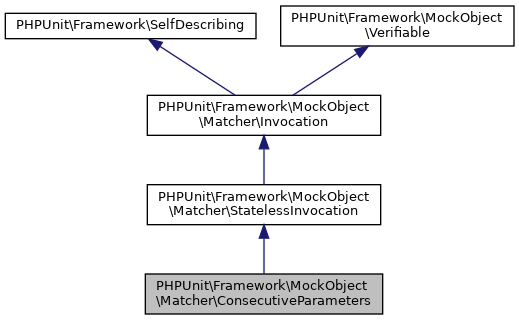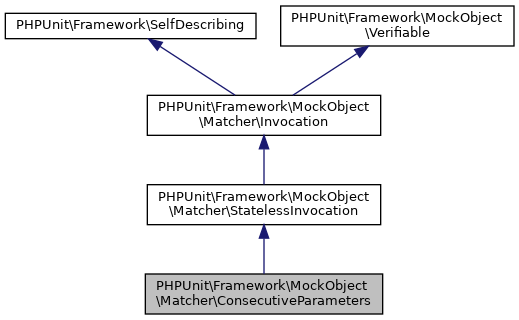

Public Member Functions | |
| __construct (array $parameterGroups) | |
| toString () | |
| matches (BaseInvocation $invocation) | |
| verify () | |
 Public Member Functions inherited from PHPUnit\Framework\MockObject\Matcher\StatelessInvocation Public Member Functions inherited from PHPUnit\Framework\MockObject\Matcher\StatelessInvocation | |
| invoked (BaseInvocation $invocation) | |
Detailed Description
Invocation matcher which looks for sets of specific parameters in the invocations.
Checks the parameters of the incoming invocations, the parameter list is checked against the defined constraints in $parameters. If the constraint is met it will return true in matches().
It takes a list of match groups and and increases a call index after each invocation. So the first invocation uses the first group of constraints, the second the next and so on.
Constructor & Destructor Documentation
◆ __construct()
| PHPUnit\Framework\MockObject\Matcher\ConsecutiveParameters::__construct | ( | array | $parameterGroups | ) |
- Parameters
-
array $parameterGroups
- Exceptions
-
Member Function Documentation
◆ matches()
| PHPUnit\Framework\MockObject\Matcher\ConsecutiveParameters::matches | ( | BaseInvocation | $invocation | ) |
- Parameters
-
BaseInvocation $invocation
- Returns
- bool
- Exceptions
-
Implements PHPUnit\Framework\MockObject\Matcher\Invocation.
◆ toString()
| PHPUnit\Framework\MockObject\Matcher\ConsecutiveParameters::toString | ( | ) |
- Returns
- string
Implements PHPUnit\Framework\SelfDescribing.
◆ verify()
| PHPUnit\Framework\MockObject\Matcher\ConsecutiveParameters::verify | ( | ) |
Checks if the invocation $invocation matches the current rules. If it does the matcher will get the invoked() method called which should check if an expectation is met.
- Parameters
-
Invocation $invocation Object containing information on a mocked or stubbed method which was invoked
- Returns
- bool
Reimplemented from PHPUnit\Framework\MockObject\Matcher\StatelessInvocation.
The documentation for this class was generated from the following file:
- vendor/phpunit/phpunit-mock-objects/src/Matcher/ConsecutiveParameters.php
 1.8.17
1.8.17